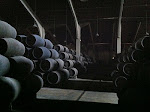Thoughts on Points
It's fashionable among many knowledgeable wine folk to hate on points as a means of rating wine. And why not hate? Points implies that there is an absolute value somewhere in wine, and that there are critics who can discern this value to the detailed level of differentiating between an 89 and a 90, or a 92 and a 93. Points tries to force a round peg into a square hole. Points takes us to a place where one person's palate is correct and that $$$ worth of purchasing decisions should be based on that opinion. Points creates an unhealthy system of incentives for producers, importers, retailers, consumers...everyone. You probably don't need me to tell you why points are bad.
I understand all of those ideas. But I've been thinking about points lately. Are they automatically terrible, or in the right hands, can they be of some use?
Allen Meadows, the Burghound, uses points in a way that works for me, mostly. He uses a range for wines tasted in barrel - a wine might be scored 88-91, for example. According to his scoring explanation, that means that the wine will be somewhere between high quality to outstanding. Wines tasted when market-ready are assigned single scores. Retail price plays no role in the scores, so Meadows is not taking value or lack thereof into account. A 90 point Beaune wine that costs $37 is the same qualitatively as a 90 point Beaune that retails for $85. 90 points in Beaune is 90 points.
And Meadows is stingy in general with the points, which I think lends credibility to the whole system. He says "There will be relatively few 90+ point wines, simply because there are relatively few outstanding and superlative wines."
In general I find the Burghound's system to be helpful because he is consistent with his own preferences, and I can figure that into my own calculations about whether or not to buy a wine. For example, the highest score ever given to a wine from Nuits St Georges is 94. Pommard, with the exception of one wine from 1864 and another from 1962, highest score is also a 94. Volnay, with the exception of a few wines from the 1800's, 96 is the highest score. Pernand Vergelesses - 92. Gevrey Chambertin - 99. The sample size he's working with is high enough so that I can trust these numbers to mean that Meadows prefers Gevrey Chambertin to Volnay, which he prefers to Nuits St Georges, which he prefers to Pernand Vergelesses, and so on. And within those appellations I can see which vineyard sites he prefers, which producers, and which vintages. I don't have to agree, but I can understand his view, and that helps me place his individual scores and notes into context as I try to reconcile them with my own preferences.
But I have some issues with his system too (and any points system). One question is this: is a 93 point Chambolle-Musigny better than a 93 point Savigny-les Beaune? Burghound's highest ever score for a Savigny-les Beaune is a 93. I won't reveal the wine(s) because that would take information that he charges for and make it free. The highest ever score for a Chambolle wine is a 99. So this clearly shows that Meadow's thinks that the wines of Chambolle can achieve significantly greater heights than can the wines of Savigny. Meadows also says: "Wines are evaluated within the context of their appellations. Simply put, that means I expect a grand cru Burgundy to reflect its exalted status."
So a 93 point Savigny means that it is the finest wine of its kind, the absolute best Savigny thus far possible. Is a 93 point Chambolle better than this Savigny or of equal quality? If the Chambolle is scored within the context of its appellation, and if Chambolle is a better place for wine to Burghound, maybe the standards for Chambolle are higher than they are for Savigny. I really don't know. And what if this 93 point Savigny can be purchased for about $50 and the 93 Chambolle costs $130. Seems like a no brainer. Unless Chambolle is better in an absolute sense, because then the 93 translates to, let's say, 95 in Savigny terms. Even then, how much money is each extra point worth?
Is a 93 point piece of pottery better than a 93 point watercolor painting? A 89 point rye bread better than a 89 point piece of injera? A 91 point massage better than a 91 point pedicure? A 97 point Yo La Tengo song better than a 97 point Aimee Mann tune? I'll take pottery, injera, a massage, and Yo La Tengo, but that's just me. My wife says I should get a pedicure, by the way.
Maybe points can be useful if the person doling them out focuses on only one art/craft form, and clearly states their own personal preferences. For example, a critic might say "I am a BBQ fanatic and I will extensively rate BBQ. By the way, I prefer pork to beef and I like no sauce whatsoever, salt rub, no spices." If this person is also giving out points to side dishes and brunch spots and hangover remedies, I just can't follow everything. Unfortunately today it is rare for a wine critic to focus on only one thing, the way Burghound (almost) does. Who, for example, could make a living out of being a Beaujolais critic?







8 comments:
Maybe not a living, but I would love to be a Beaujolais critic.
Claude Kolm noted that points for him is simply a way to rank order. So I suppose if you happen to have read Claude's work enough and can discern what it is that he does and doesn't like, you can get some feel for wines that Claude tastes that you haven't vis-a-vis each other.
I have no use for points at all but understand how others can and do use them. Or abuse them, as the case may be.
But they are a fact of life in the wine world and to rail against them endlessly is futile.
Take what you like from a critic's work, leave what yu don't. I'd be throwing the point scores out but maybe the next guy won't. Plenty of room at the table for us all.
Best, Jim
I can't refute Florida Jim's assertion that to rail against points is futile; but in my life futility hasn't stopped me before, so...
On the whole the negatives of points outweigh the positives. The concept is logical but misuse and abuse have ruined what was intended as simply an instant marker of ranking.
The amount of background research required to "calibrate" any given critics point scale is impractical and unreasonable and what one determines may not even necessarily be accurate or consistent. A while back Meadows stated that he was reluctant to adopt the 100 point scale but ultimately felt he had to in oder for his work to be accepted and taken seriously.
IMO the point system intended to benefit consumers turned out to benefit sellers more over time. The subjective nature of scoring on a precise numerical scale was always a questionable proposition. I suppose it can said that 89 point scores often result in bargains for consumers.
Neil,
A very clever and diplomatic piece. I started very much in favour of points, but I think I am wavering. The one thing that still convinces me is that by putting a rating to a wine - be it a word or a number, you are also putting your neck out, allowing someone to agree or disagree with your assessment.
Florida Jim - I'd like to be a beaujolais critic too. maybe we could start a business? "Plenty of room at the table for us all." Agreed.
Ned - "The amount of background research required to "calibrate" any given critics point scale is impractical and unreasonable and what one determines may not even necessarily be accurate or consistent." Well said.
Edward - thanks, pal. Doesn't saying anything at all about a wine stick your neck out?
Thanks you all for these insightful comments.
Burghound and Parker give bracket scores for barrel samples. But the finished wine NEVER scores outside the brackets. They must have some sort of superhuman senses if they're able to judge a wine's future performance that precisely without checking their "cheat sheet" of previous scores. And they almost never taste blind. Especially in the case of the Burghound, scores seem to be very closely tied to appeletions as a result.
Jancis Robinson is much more credible to me for her insisteence of tasting blind whenever possible, and her policy of never checking past notes when assessing. BUT her scores are often all over the place for a given wine, depending on tasting date, other wines tasted the same date, air pressure and who knows what else.
hi Frank - thanks for your comments. i didn't realize that Bghd's scores are never out of the original bracket. and what you describe of Janci's scores: "her scores are often all over the place for a given wine, depending on tasting date, other wines tasted the same date, air pressure and who knows what else" sounds like you could be describing the experience of tasting wine in general. it shows differently depending on a load of factors. again, requires familiarity with jancis though...
Absolutely. But although her scores may seem all over the place, she still has terrific consistency if you're looking at average scores. But every wine buff knows that an 87-pointer could easily be a 92-pointer the next day.
That's why I like the "revue du vin de France" system. Aside from a 20-point scale for individual wines, they give zero to three stars for the producer. When a producer is rated, that is usually a lot more reliable than how a certain wine from a certain vintage was showing on the date tasted. And if a three-star producer has words like "succesful" in the tasting note, that's really all you need to know.
Will I buy it again is the only ranking system that matters for me. Points are so beyond me and I believe they had more meaning in the beginnings of wine criticism when wine was not treated like celebrity, like it is today. I can never remember a time in wine history when points were more meaningless than they are today. With everybody and their mother rating wines does anybody really care if Wilfred Wong gave Chateau St Jean 96 points, Gary V gave it 97 ponts, and Parker did not rate it?
I really think as the wine critical hierarchy gets more and more diverse points will become more and more meaningless. I mean people are questioning tasting notes now, which are actual strings of words that sometimes make sense, but more than not are just people jockeying for who can name the most fruits in a tasting note. So with this new attack on tasting notes, how can anyone actually think they are relevant? Yes, arguing against points is fruitless, but considering it is the universally accepted system for giving wines merit, somebody has to do it, and because it is fruitless, that is no reason to stop. Who else is going to do it?
Post a Comment